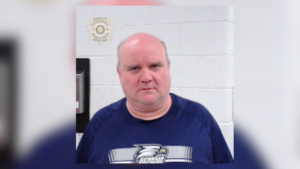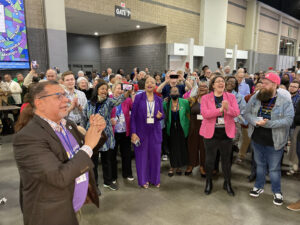
FORT WORTH, Texas (BP)–Dispensationalists who criticized 19th-century Bible scholars for placing themselves between the laity and the Bible assumed the same role in trying to explain and promote dispensationalism in America, said a church history professor at Southwestern Baptist Theological Seminary in Fort Worth, Texas, Feb. 4.
Playing off the backlash against higher criticism’s challenges of traditional Christian beliefs, proponents of dispensationalism would “always champion the rights and abilities of common people at the expense of the experts,” said Timothy Weber, a professor at Northern Baptist Theological Seminary, Lombard, Ill., during Southwestern’s Day-Higginbotham Lectures.
They argued that higher criticism put an expositor between believers and the Bible in the same way Catholicism had placed a priest between the believer and God, Weber said.
Ironically, he noted, dispensationalism is a complicated theory and the leaders, in explaining its ins and outs, were acting in the same role as higher critics or expository scholars.
Delivering the last of four lectures on Baptist eschatology, Weber said dispensationalism became a “popular religion,” appealing to people, pastors and teachers outside “the academic and ecclesiastical elite.”
In addition to attacks on higher criticism, Weber attributed the rise of dispensationalism to the Scofield Bible, Bible conferences and “solid networking” by dispensational leaders.
The Scofield Reference Bible, first published in 1909 with notes explaining the dispensations, became extremely important to the movement. Weber cited a 1987 survey of 461 ministers that found 41 percent cited the Scofield Bible as having the greatest influence on their eschatology, while 33 percent listed a seminary education as the greatest influence.
Popular religious movements, such as dispensationalism, Weber said, are built on solid networking, and dispensationalist leaders knew how to recruit others and build their own educational institutions.
Beginning in 1868, Bible conferences also helped the movement to grow. While dispensationalism grew among laypeople, it remained almost undetectable in seminaries or in denominational headquarters, he said.
By the 1920s and 1930s, dispensationalism had become identified with Baptist fundamentalists and from then on gained strength. By 1985, about half of Southern Baptists who thought of themselves as conservatives were dispensationalists, making the Southern Baptist Convention the movement’s “biggest success story,” Weber said.
Weber estimated that 46 percent, or 13 million, of Baptists in America are dispensationalists, including 9 million Southern Baptists. Eleven million of the 13 million live south of the Mason-Dixon line, he said.
He attributed the success to dispensationalists’ support of Baptist traditions, namely the inerrancy of the Bible, its supremacy in theology and Baptist revivalism.
The belief that Christ could return at any moment gave evangelists “another arrow in their quiver. The rapture became a very forceful tool to get sinners to contemplate their fate,” Weber said.
John Nelson Darby, a 19th-century Anglican priest, is credited with being the first to teach dispensationalism, arguing that God works with humans in different ways in different eras, or dispensations, and that God first worked with Israel and then with the Christian church, Weber recounted. For Darby, God would keep his promise to restore the Jews, but only after his work with the church is finished when Christ takes the church out of the world. After the rapture, Christ would begin his millennial reign.
Weber said dispensationalism first found a home among Northern Baptists in the late 19th and early 20th centuries, especially among Baptist leaders such as A.J. Gordon, the “Baptist Pope of New England,” I.M. Haldeman, A.C. Dixon and W.B. Riley. The South, mainly postmillennialists, began to shift when men like J.R. Graves, J. Frank Norris, T.T. Martin and Billy Graham began to impact the thinking of Baptists, Weber said.














